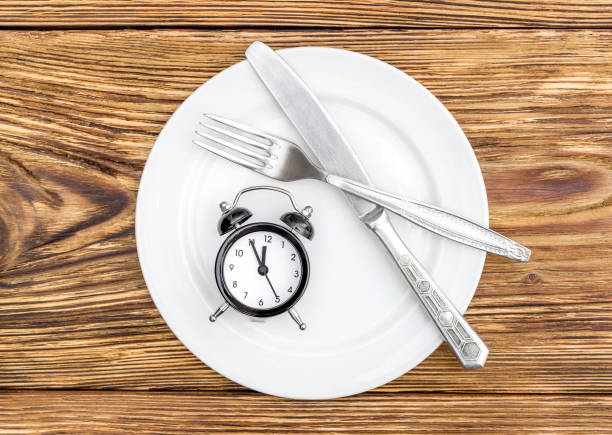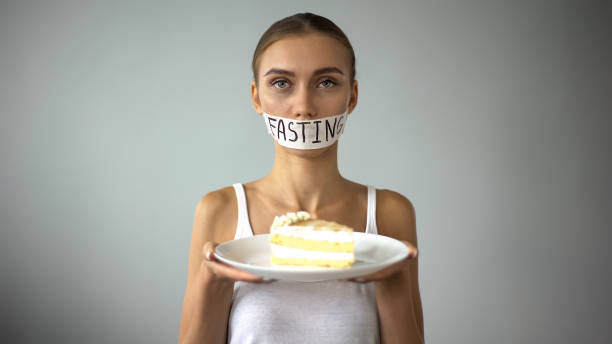
Intermittent fasting for weight loss
Intermittent fasting for weight loss is effective but it is not for everyone. Fasting is indeed great for people who wants a quick fat loss but many can’t stick to it.
Fasting diet routines are getting very popular in recent years with many popular celebrities and fitness enthusiasts doing it. Popular celebrities who swear by it are Hugh Jackman, Chris Pratt, Kourtney Kardashian, Beyonce, Jennifer Lopez and Nicole Kidman. There are too many to name.
Over the years, dozens of weight loss diet programs have come in and out of trend while intermittent fasting has gained popularity.
Why is intermittent fasting so popular and what is the science behind it?

Let me briefly explain what is the meaning of fasting.
Fasting is a type of eating schedule that restrict eating (no solid food and caloric beverages) for a period of time ranging from 12 hours up to 48 hours.
Fasting is an eating routine/schedule, not a diet. It doesn’t restrict any food types but rather restricts the total amount of calorie intake within a certain period or window.
It is a calorie restriction process. During the fasting period, you are allowed to drink plain water. No caloric beverages or sweet drinks are allowed.
According to some studies, fasting for more than 10 hours encourages our fat stores to be used as energy. It breaks down fat tissues into free fatty acids known as ketones, which are released into the bloodstream.
During this fasting period, our insulin levels will drop drastically, allowing our body to metabolise fats as an energy source, resulting in effective fat loss.
Do not eat more than usual during the eating window. It will not be effective if you do so. Some people might have the feeling of starvation, hence makes them eat more than usual after breaking their fast. This is also known as compensatory over-eating.
However, fasting if done incorrectly, can lead to under-nutrition or malnutrition.
Always make sure you have a well balanced diet during the eating window. Do not skip any nutritious food types.

Make sure your diet includes veggies, fruits, fibre, protein-rich whole food, vitamins and anti-oxidants. Avoid snacking on processed foods, refined sugars, preserved foods and high fat foods.
There is a huge number of research and studies that supports the health benefits of fasting. Below are some of the benefits claimed according to National Institutes of Health, USA.
Benefits of Intermittent fasting

- Improve the biomarkers of health diseases
- preserve human learning process and functionality
- reduce oxidative stress on our body
- reduce inflammation
- improves brain memory function and slows down brain diseases
- improves cardiovascular system
- improves our body’s response to cope with stress
- reduces asthma-related problems
- improves quality of life
- curbs hunger in the long run, reduces appetite
- improves insulin sensitivity hence reduces type 2 diabetes
- reduces hypertension
- improves alertness and energy levels
There is no right or wrong way of doing intermittent fasting as long as it suits your lifestyle.
Different types of intermittent fasting

Here are some of the popular ones.
- Fast for 12 hours
- Fast for 16 or 18 hours
- 5:2 diet
- Periodic fasting or alternate day fasting
- Meal skipping
Fast for 12 hours:
Its a very simple and fairly reasonable type of routine. No eating / calorie intake for 12 hours with a 12 hours eating window.
Best way to do 12 hours fasting is to include sleeping hours in the window. Eg, Have your dinner at 8pm and breakfast at 8am.
This 12:12 intermittent fasting is simple and easy to keep track. Reason is because the fasting period is rather short and most of the fasting period includes sleeping hours at night.
Therefore, it is a good option for beginners who wants to start losing weight.
Fasting for 16 hours or more daily:
This is also known as the 16:8 method. You fast for 16 hours and leave an eating window of 8 hours.
You can also try out a more challenging method by increasing the fasting window. For example, 17:7 or 18:6.
Do be careful when you increase your fasting hours. Make sure you try the 12:12 fasting method first.
These challenging 16:8 methods are great for people who do not see any benefits from the 12:12 method.
Fasting can start after your dinner at 7pm till the next day 11am or 12pm.
Fasting on alternate day:
There are 2 types of alternate day fasting.
First type is a complete restriction of food while the second type allows you to consume up to 500-600 calories per day.
Interestingly, there are some studies showing that alternating fasting is effective for quick weight loss in obese adults. Researchers have also found out that it helps to improve their heart health.
However, fasting for 24 hours completely without food is no easy task. It is considered an extreme form of intermittent fasting. Its definitely not recommended for beginners and people with medical conditions.
These group of “hardcore” people fast from breakfast to breakfast.
It is difficult to go without food for 24 hours, thus making this type of routine non-sustainable. We do not recommended it for long term practice.
It may cause extreme low blood sugar leading to dizziness, fatigue, nauseas and migraine. However, those who have tried, noticed a reduced side effects in them over time. Our body will adjust itself and adapt to this type of eating habits.
Further studies need to be done in order to back up for its health effects on human bodies.
The popular 5:2 diet
Choose 2 days in a week for calorie reduction. Eat normally for the rest of the 5 days. Remember not to over compensate on the calorie intake on normal days.
During the 2 fasting days for men, consume about 500-600 calories in a day. For women, consume about 400-500 calories in a day.
Below is an example of a 5:2 diet.
Choose 2 days in a week in which you think are the least stressful and less workload. You wouldn’t want to go super low on calories during those busy days.
These 400-600 calories can be split into 2 meals. Some people only eat one meal on their fasting day. There is no right or wrong. It all depends on your own preferences.
You may want to try fasting on Monday and Thursday. Make sure there are at least 1-2 normal eating days in between. This is to prevent your body from going too low in blood sugar.
Some experts found out that this 5:2 fasting diet helps to reduce insulin levels effectively among overweight people. It also helps to improve insulin sensitivity among healthy adults.
Meal skipping:
This is another extreme form of fasting. It is also known as the “Warrior Diet” .
People who follows this type of fasting pattern usually only eat 1 meal per day. Usually a large dinner during the 3-4 hours eating window.
Why dinner and not breakfast or lunch? These “Warrior Diet” supporters claimed that eating at night close to their sleeping time, helps their body to absorb nutrients effectively.
However, no medical studies have been done to show any benefits.
On the other hand, there is a risk of not consuming enough nutrients and fiber. Possible adverse effects such as indigestion and weak immune system can happen among people that skip important meals.
Also, eating such a large meal before bed time can cause bloating and discomfort, affecting one’s sleep.
Therefore, further research needs to be done before embarking on this type of fasting.
People who are not suitable for intermittent fasting:
- people who are on medications for certain health issues. Eg, high blood pressure.
- people with advanced diabetes
- pregnant women
- breast feeding women
- people with eating disorders such as anorexia and bulimia
Intermittent fasting tips and advices

1. Decide if its right for your body and health condition.
It is not for everyone. Your experience on dieting, eating habits, exercise regime and overall lifestyle should determine whether you should try or not.
2. Start slowly and gradually.
We would recommend you to start with the 12:12 method first. Do not rush into extreme fasting hours (more than 12 hours) immediately. Check your meal times and do minor adjust.
3. Check on your body’s response. Observe how you feel.
After a couple of fasting days, do be aware of how your body respond to the changes in meal timings. Go back to normal eating hours if you feel any signs of giddiness or nauseous feeling.
4. Don’t expect fast weight loss in the beginning. Be realistic.
Losing body weight too fast is not good for health. You might be losing muscle mass, nutrients and body fluids. Expect ups and downs. Our body needs time to adapt to changes. Probably 2-3 weeks.
5. Focus on the process of fasting. Not at the weighing scale.
We feel more motivated if we enjoy the process of fasting. Looking at the scale will cause disappointment. Make it sustainable by looking far.
6. Learn to face hunger not starvation.
Being hungry is just a feeling. Its normal for our body to ask for food within couple of hours, especially we have been doing so since we are born (eating on time). Break the cycle and let your body adapt to the new cycle.
7. Appreciate the privilege of having food.
Kick the habit of binge eating and snacking. Treat your eating window seriously with proper meals and nutrition.
8. Train your mind to control hunger.
Go deeper into analysing your psychological state and experience the true meaning of fasting.
9. Do not fast too long (more than 24 hours)
Being too extreme does not help. Don’t get too obsessed with it and let it affects your lifestyle. Remember, health and family comes first. Not how you look. Weight loss is secondary.
10. Do not over compensate on your calorie intake during the non-fasting period.
Many people over eat when they break their fast. Remember, its the total amount of calories that makes a difference in weight loss.
11. Watch out on how you feel. Not how you look.
Mood, energy levels, sleep quality, mental state, drastic hunger, immunity level, often falling sick, hormonal changes and emotional health are important factors.
12. Avoid overtraining.
Doing too much exercise during fasting is not recommended. It increases our stress hormones (cortisol). We recommend you to do high to moderate intensity workouts. Make sure you have enough fuel if you do long hours of endurance training.

Always remember:
If you are ready to try IF, make sure it fits into your routine and lifestyle. It is not an obligation but a flexible way of reducing your calorie intake for better health.
It shouldn’t gives you too much psychological and physical stress. It should fit well into your regular working hours and social lifestyle.
Have a thought and think deeper before we start. It will definitely work if you enjoy the whole process of fasting.
If you have any questions, contact us for a free diet consultation!

